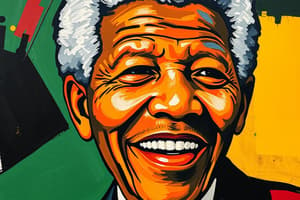Podcast
Questions and Answers
What was Nelson Mandela accused of that led to his imprisonment in 1963?
What was Nelson Mandela accused of that led to his imprisonment in 1963?
- Conspiracy to commit murder
- Illegal possession of firearms
- Inciting violence during protests
- Sabotage and attempting to overthrow the government (correct)
Where was Nelson Mandela imprisoned for 18 years alongside Walter Sisulu and Ahmed Kathrada?
Where was Nelson Mandela imprisoned for 18 years alongside Walter Sisulu and Ahmed Kathrada?
- Sing Sing Correctional Facility
- Devil's Island
- Alcatraz
- Robben Island (correct)
When was Nelson Mandela released from prison?
When was Nelson Mandela released from prison?
- New Year's Day, 1980
- Valentine's Day, 1990 (correct)
- Christmas Day, 1985
- Independence Day, 1994
What did Nelson Mandela advocate for within the prison walls and beyond during his incarceration?
What did Nelson Mandela advocate for within the prison walls and beyond during his incarceration?
Which former U.S. President mediated the negotiations that led to the adoption of a new constitution in South Africa in 1994?
Which former U.S. President mediated the negotiations that led to the adoption of a new constitution in South Africa in 1994?
For what ideals did Nelson Mandela emphasize the need throughout his life?
For what ideals did Nelson Mandela emphasize the need throughout his life?
When did the National Party come to power in South Africa?
When did the National Party come to power in South Africa?
Which university did Nelson Mandela attend before studying law?
Which university did Nelson Mandela attend before studying law?
What was Umkhonto we Sizwe?
What was Umkhonto we Sizwe?
What was the main goal of apartheid in South Africa?
What was the main goal of apartheid in South Africa?
How did apartheid affect the country of South Africa?
How did apartheid affect the country of South Africa?
What did Mandela do as an anti-apartheid activist?
What did Mandela do as an anti-apartheid activist?
Study Notes
Nelson Mandela's Fight Against Apartheid
In the turbulent history of South Africa, few figures have left such indelible marks as Nelson Rolihlahla Mandela. Born on July 18, 1918, into the Thembu royal family, he became one of the most prominent champions against apartheid — a system designed to entrench white minority rule by assigning racially segregated rights, privileges, and territories. Here we delve into Mandela's life and his unwavering opposition to this inhumane regime.
Rise of Apartheid
Apartheid originated from laws passed during World War II when the National Party came to power in 1948. These measures intensified segregation, curbed black political involvement, and encouraged urbanization of whites to maintain their dominance. This institutionalized framework divided the country deeply along racial lines.
Mandela's Early Life and Activism
Mandela was educated in Fort Hare University College before studying law in Johannesburg and London. After returning home, he joined the African National Congress (ANC) in 1943. As a tireless anti-apartheid activist, he organized strikes among workers, formed alliances with trade unionists, and campaigned against discrimination. His efforts were consistently thwarted by government oppression and arrests.
Formation of Umkhonto we Sizwe
Faced with mounting brutality, Mandela cofounded Umkhonto we Sizwe ("Spear of the Nation") — the armed wing of the ANC — in December 1961. Influenced by anticolonial struggles worldwide, they sought to liberate South Africans through sabotage and guerrilla warfare while pursuing peaceful means wherever possible.
Imprisonment
After years of fighting apartheid, Mandela was imprisoned in 1963, accused of attempting to overthrow the government and sentenced to life in prison without parole. He spent nearly three decades incarcerated; 18 of which were served on Robben Island, where he worked alongside fellow prisoners like Walter Sisulu and Ahmed Kathrada. During these difficult times, Mandela relentlessly advocated peacefully for equality within the prison walls and beyond.
Release and Negotiations
On Valentine's Day in 1990, after global pressure and growing domestic discontent, President FW de Klerk announced that Mandela would be released from prison. Upon release, Mandela immediately resumed efforts toward freedom, reconciliation, and democracy. Following lengthy negotiations mediated by former U.S. President Carter and other international leaders, a new constitution was adopted in 1994, providing universal suffrage.
Presidency and Legacy
As South Africa's first democratically elected president, Mandela oversaw the transition from a repressive state to a constitutional order based upon human dignity, equality, and freedom. Throughout his life, he emphasized the need for forgiveness, tolerance, and understanding between races. In recognition of his extraordinary contributions to liberty and justice worldwide, he received numerous honors including the Nobel Peace Prize in 1993, shared with de Klerk.
To this day, numerous statues, museum exhibits, and films honor Nelson Mandela's life and legacy. His commitment, courage, and dedication continue to inspire countless individuals around the world seeking justice, equality, and peace.
Studying That Suits You
Use AI to generate personalized quizzes and flashcards to suit your learning preferences.
Description
Delve into the remarkable life of Nelson Mandela and his relentless opposition to the apartheid regime in South Africa. Learn about his activism, imprisonment, release, presidency, and enduring legacy that continues to inspire people worldwide.




